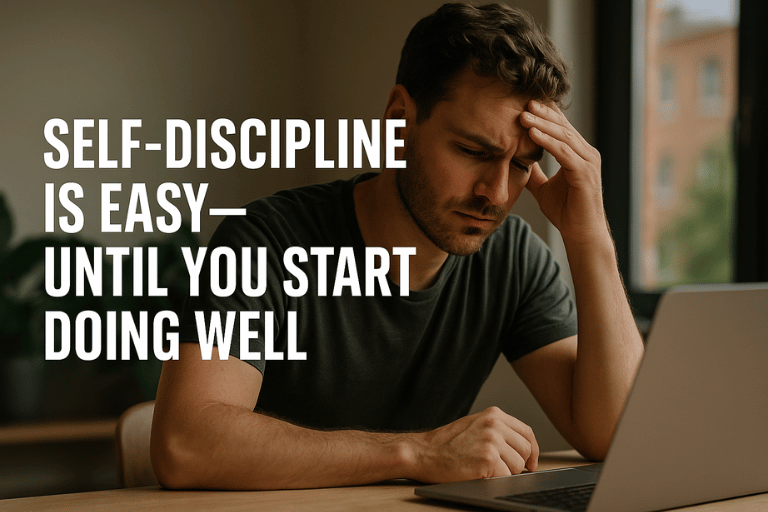Self-Discipline Is Easy—Until You Start Doing Well
It's Not About Quitting. You Just Got Comfortable
I was harder on myself when fear was in charge. Back when having nothing meant I couldn’t afford to screw it up.
There was huge pressure and a deep desire to succeed.
I had something to prove. Something to fix.
Now?
I still want to grow. But not with the same urgency.
And that changes everything.
What Nobody Tells You
The hardest part of discipline isn’t getting started.
It’s keeping it up when things stop feeling urgent, desperate.
Early on, you’re fueled by necessity.
You build the habits. You stick to the plan.
You’re running from something. Debt, regret, burnout, whatever.
The pain is clear.
But when things improve, even slightly, so does your tolerance for excuses.
You snooze once.
You skip a session.
You change “every day” to “most days.”
You tell yourself it’s fine.
And technically, it is.
That’s what makes it dangerous.
The Real Discipline Drop-Off
The moment you stop struggling, something subtle kicks in:
Your brain relaxes.
You’re not lazy. You’re just no longer in survival mode.
And that shift rewires how you see effort.
There’s a psychological factor for this kind of pullback, regression to the mean.
You hit a high, and your system naturally drifts back toward comfort. Even if it’s not intentional.
It’s not sabotage. It’s a reset.
Your nervous system comes off high alert, and discipline doesn’t feel necessary anymore.
But if you don’t notice that shift, you slowly slip backwards to where you started.
How It Shows Up
It’s stealthy.
You stop tracking progress.
You push tasks to “later.”
You stop checking in with why you’re doing any of this in the first place.
The tricky part?
You’re still doing something. You’re not crashing. You’re drifting.
Drifting feels harmless until a few weeks pass and you realize your edge is gone.
You didn’t quit.
You loosened your grip, and things started to slip.
That’s when the discipline fades, and your excuses start sounding reasonable.
What Helps
There’s no perfect system here. But one thing helps:
Recognize the shift. Call it out. Don’t pretend nothing changed.
You can’t discipline your way through comfort the same way you did through chaos.
The mindset has to change.
Discipline, when things are good, isn’t a choice.
You don’t get to give up, slow down or coast.
It’s the only thing standing between you and the slide back to chaos.
You didn’t come this far to ease off when you’re where you want to be.
And if you stop showing up now, you’ll be the loser.
Maybe not overnight. But fast enough to notice when it’s already too late.


